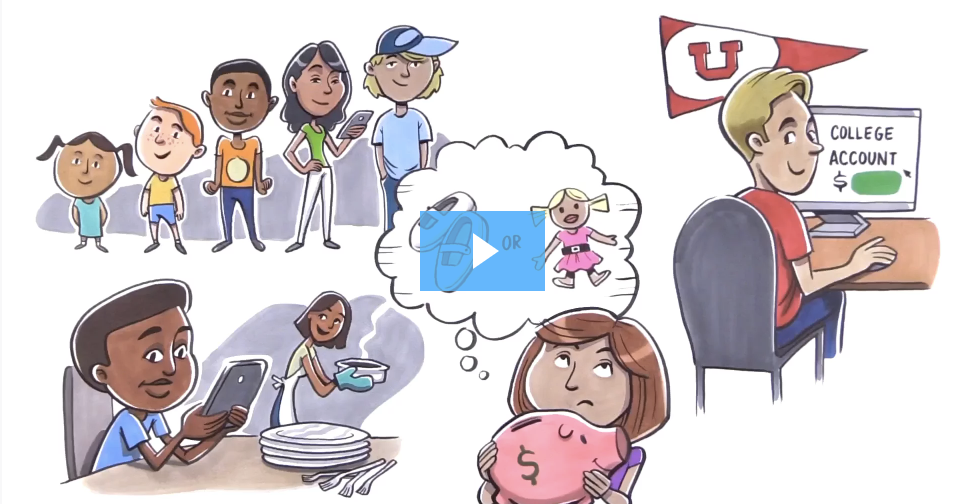MilKids - Tips & Tools to Raise Financially Fit Kids
MilKids - Tips & Tools to Raise Financially Fit Kids


Values and Habits
Children often model the behavior of their parents, so it’s wise to first take a look at your values and habits with money management and evaluate if you need to make changes.
Do you feel knowledgeable and confident in your current financial situation? If not, consider our Money Ready guide to help get on track.
Have you reflected on your own childhood to see what lessons you might have learned from your parents? What experiences, positive and negative, can you draw from to help get your children off to the right start financially?
First, we’ll help you examine your current situation, then we’ll help guide you through some tips to communicate with your children and assist in creating goals and a solid financial foundation.
Self-Assessment
You may be feeling very confident in your knowledge and situation to comfortably talk to your child(ren) about money. If so, you may decide to skip this step and read further for some tips to communicate effectively with your child(ren), along with age-appropriate ideas.
If you’re a bit hesitant to dive in, here are some tools to help you get a sense of where you are and how to get started.




Pro Tip: Sit down and do these activities with your spouse. Determine which habits to change. Set goals and discuss the steps to get there.
What lessons have you learned? What lessons do you want to pass along? What messages do you want to send to your family?
Communication Skills
Did you know most communication is nonverbal? What we say is important but so is how we say it. The goal is to create a trusting environment with open dialogue and a positive attitude, so kids can ask questions, listen, and focus on present and future goals.
How do you communicate with your spouse?
Consider establishing regular check-ins to discuss finances — once a month or each pay period will work. Find what’s right for your family and stick to it.
Accept your financial differences. You are bound to have different values and habits when it comes to money, so learn to communicate well and compromise. Seek professional help when you can’t agree on a middle ground. Financial counselors are available to help for free on your installation.
How do you communicate with your child(ren)?
Money can be a difficult topic to discuss. The key is to have a positive attitude and create a foundation of trust. Be open and honest, and if it is a difficult topic for you to discuss, that’s OK. Give your child(ren) the opportunity to ask questions, listen to their thoughts and help guide and focus them on their goals.
Above all, make sure to keep these discussions light and fun! Incorporate books and games into your conversations about money. Doing so can help your children learn important financial concepts.
How do children communicate with parents?
Kids may want to know why talking about money is important. One of the best ways to explain this may be openly discussing your family spending plan and how you make decisions on needs versus wants. Explain that the family spending plan helps to make sure you are using money to take care of needs, and it also helps you know how much money to save for longer-term goals. Kids thrive in a supportive learning environment. It’s a good idea to start with setting goals.
Goal Setting
Establishing goals is an important aspect of teaching children about money. Talk about things you need now and goals to save for in the future, such as a family vacation or college.
When setting goals, make sure they are SMART — that is, Specific, Measurable, Attainable, Realistic and Time-bound. Learn more about SMART goal setting, here.
Understand that even very young kids are exposed to advertising and peer pressure. Have an open conversation with your children about how they see money based on their experiences at home, with friends, and on social media to help guide your efforts.
The conversations you have with your children will change as they grow, and the whole family can continue learning together!
All About Allowances
First, examine the family spending plan. Does an allowance fit? If so, decide how much allowance to give and at what age to start. Here are a few tips:
Be consistent. Learning to manage money is like any other task. The more we do it, the better we get at it. Use mistakes that happen along the way as teachable moments.
Systems for Saving
There are many systems families can use with young children to help them begin to understand the concepts of saving and spending. The key is to keep it simple and age appropriate.
- Saving – money set aside for a special occasion or specific goal
- Spending – money set aside to buy the items we need and want
Clear jars help kids visually see what they have and the impact of saving and spending. It also begins to teach them to think about the way we categorize money for different uses.
Creating a Spending Plan
As children earn an allowance and save money, it’s important to have a full understanding of needs and wants to help prioritize spending. Depending on age, their spending may not be much, but the sooner these habits are formed, the better prepared they should be for the future.
Here are three tips to help your children create a spending plan:
This sample spending plan worksheet might help you get started.

Age-Appropriate Tips & Videos
The age and developmental stage of your child will guide how you teach them about money. We’ve created some age-appropriate videos to help you enhance the conversation. Watch this short video below to help you get started.

The PDF chart below gives age-based suggestions for activities you can do with your children. The main idea is to make these activities fun, easy and engaging!

Financial education is a life-long process for children and adults. As parents, we can help prepare our kids to make smart money decisions at every age.
There are many things we can do to continue the learning process. Keep up with current financial news. Visit financial education websites. The age-specific resources listed below are a good starting point to help you learn more about money as a family.
Select the Age of Your Child Below
Additional Resources
Consumer Financial Protection Bureau
This page on the CFPB’s website has information for parents and educators to teach children of every age about finances. There are games, book suggestions, and curriculum resources available.
U.S. Department of the Treasury — Financial Literacy and Education Commission
Games, tools, educational resources, and more are available here.
Military OneSource: Seven Tips for Teaching Teens Money Management
This article has great tips to help teens learn money management skills.
Recent Blogs
March Money Moves: Navigating Tax Season While Preparing for Summer Fun
As we welcome the arrival of spring and the promise of warmer weather, it’s easy to get caught up in thoughts of summer plans and family vacations. But with tax season in full swing, it’s important to balance excitement for the upcoming months with a push to wrap up tax season. While those topics couldn’t…
Read MoreCommunicating with Your Partner About Finances: A February Focus on Financial Wellness
Talking Money with Your Partner As we celebrate loving relationships this month, it’s important to remember that not all conversations come up roses between couples. Sometimes discussing finances can be tricky and stir up negative emotions. Open communication about money is vital for building trust and nurturing a healthy relationship. Whether you’re a new couple…
Read MoreBuild Financial Wellness from the Ground Up in 2025
There’s something magical about the ball dropping at midnight and turning the page to a new year. For an instant, it feels like you’ve got a clean slate, and anything is possible. In some ways that’s true, but as the calendar page turns, your responsibilities, bills and financial challenges remain. Many people make resolutions to…
Read More5 Financial Resolutions to Start the New Year Off Right
You don’t need to wait until January to take a fresh look at your finances. Get a jump on the new year with these five resolutions — they can really pay off over the next 12 months. 1. Set/update your budget Setting a budget is the first step in a military family’s financial planning. And…
Read More5 Financial Power Moves for MilSpouses
During National Veterans and Military Families Month in November, we salute the strength of our families as they support the mission of our community. MilSpouses, especially, display determination as they face the challenges of military life. We see you navigate frequent moves, deployments and often raising children as a solo parent. We understand your motivation…
Read MoreThe Year In Review: Bring Your Financial Picture into Focus
It can be fun and even eye-opening to watch those year-end montages reminiscing about the year. If you ever have that moment when you say to yourself, “Wait, that was this year?”, you could also imagine how easy it could be to lose track of the goals and financial plans you set in motion when…
Read MoreNow’s the Time to Think About Life Insurance
Hey, MilSpouses, it’s Life Insurance Awareness Month! Okay, so maybe that doesn’t make you want to break out the cake and ice cream, but life insurance is an important part of your financial plan. It can help take care of your family, giving them financial security if something happens to you or your service member.…
Read MoreBudget and Insurance: What to Do After You PCS
After months of planning and hard work, you’ve landed safely at your next duty station. Congratulations! As you kick off this next chapter in your MilLife, it’s a good time to check in on your finances. Let’s look at two key items that are likely to change after a PCS: your budget and your insurance.…
Read More











